
Photo: UN Photo/Martine Perret
Each year UNCIVSOC is arranged at the Swedish Armed Forces international centre in Kungsängen, Sweden (Swedint). The training prepares civilian staff for work in UN-led peace operations, and the challenges and opportunities that come with the role. After some intense weeks this year’s course is now over. Many of the participants are already deployed, whereas others aspire to go on a mission. For all of them the training is a chance to expand their network.
During the initial week the participants are stuffed with knowledge about the organization of the UN, field of expertise, decision structures and partners. Several of FBA’s employees hold lectures on disarmament, demobilization and reintegration, security sector reform and conflict analysis. Apart from theory and subject knowledge the participants also get to practice cooperation. In these so called integrated multifunctional peace operations civilian staff, military and police join forces.
At the same time there is a course for military staff, UNSOC. During the final week the participants gather for a role-play that puts them in front of a fictive scenario. A UN office is set up with civilian, military and police units and they have to deal with problems that appear in the imaginary Bogaland. For example provide humanitarian aid to internally displaced people, manage groups that obstruct the efforts, and build confidence among civil society. The scenario of this year’s training had similarities to the actual situation in both Mali and South Sudan where many of the military participants will serve.
– Future UN staff need in-depth knowledge about how to convert a resolution into real results when serving a mission. Equally, they have to understand the requirement for a common situation awareness in integrated multifunctional UN peace operations with a chapter 7 mandate, says Bodil Israelsson, responsible for civil-military relations at FBA.
Intrastate violence is the most common form of conflict nowadays. Through chapter 7 of the UN Charter the UN Security Council can impose military sanctions when a country acts in a way that threatens peace. Its far reaching powers make chapter 7 an important tool.
None of the current UN peace operations in the world are there to only observe the situation.
– In some of the recent operations there is no peace to keep, their mission is rather to enforce peace. This differs from traditional UN peace operations, Danish diplomat Ellen Loej explains.
She contributed to the course by sharing her experiences from leadership in UN peace operations as Special Representative to the Secretary-General (SRSG) in Liberia and Head of the UN Mission UNMIL in 2008-2012, and Head of UNMISS in South Sudan in 2014-2016.
Raul Arbinus coordinates UNSOC at Swedint. Similar trainings are carried out in many places around the world, he says, but Kungsängen is one of few where civilians, military and police train together. The advantage is that the participants get to try out how it works in reality. “Train as you operate” is the idea.
This year, there were around 70 participants in UNCIVSOC and UNSOC, mostly military personnel. Those who have previously been on missions with Nato and the African Union have to adapt to a new approach. In UN peace operations the Head of Mission is generally a civilian, and often also in charge of the political work.
– We have three different cultures –civilian, military and police – with three different languages. There is a constant turnover of staff in operations. Training the participants in how to deal with internal difficulties that might appear makes them better prepared for the assignment, Raul Arbinus says.
Cooperation is a matter of leadership – and something you need to practice, he claims.
– We want the participants to understand each other’s perspectives and highlight the consequences from all sides of a conflict. Lack of information can put a whole country at risk.
Protection of civilians is the overall mission of all parties. Anders Kompass, former Field Operations Director at Office of the UN High Commissioner for Human Rights (OHCHR), alarms about abuse committed by UN staff in the Central African Republic in 2014 has influenced the training.
– We have a strong focus on legal frameworks for human rights and our code of conduct, says Raul Arbinus, and adds that a gender perspective is included in almost all parts of the training.
MORE FROM HOME
What does research tell us about strategic civil-military leadership in UN integrated missions? The recent FBA research brief "Mission Leaders: An Evidence-based Assessment” presents seven policy recommendations.
2025-07-01 13:34FBA has both increased and adapted its work in Ukraine in the wake of Russia's invasion.
FBA in UkraineKlara Grenhagen works as a specialist at FBA's Africa unit with a focus on dialogue, reconciliation and peace processes.
More about our expertsFBA is part of Sweden’s development aid within the area of peace and security
Read more about the countries where we work